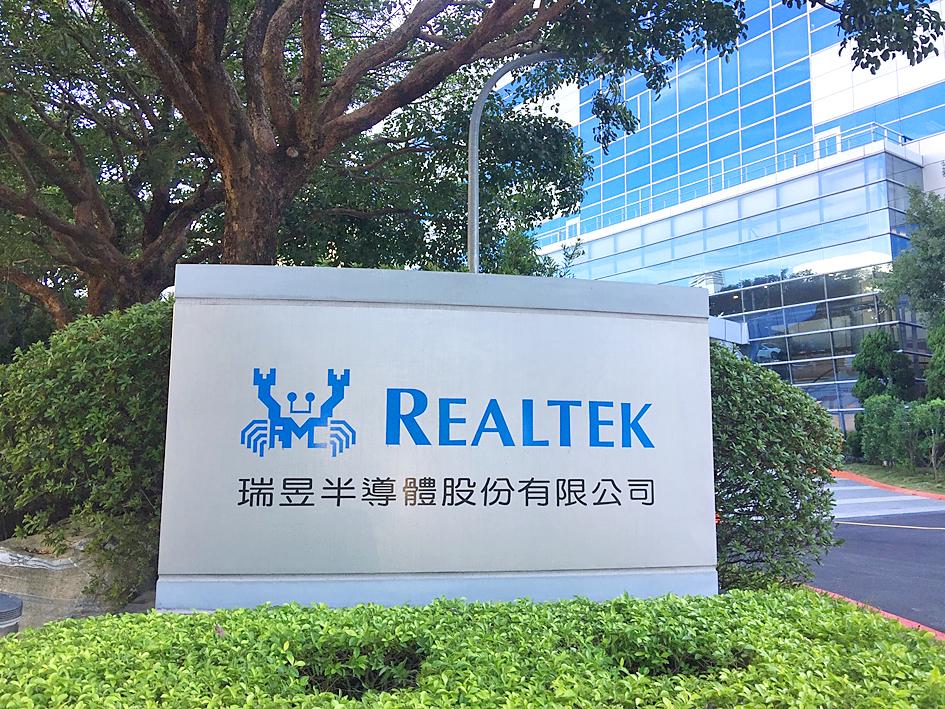Networking chip designer Realtek Semiconductor Corp (瑞昱半導體) yesterday said that there has been healthy demand for Ethernet switch and Wi-Fi chips through the first half of this year, as the work-from-home and distance-learning trends are stimulating a broad infrastructure upgrade.
Realtek said that growth momentum is extending from last year as the trends are here to stay amid the COVID-19 pandemic this year.
That is also spurring demand for Internet surveillance devices and outdoor LED displays that incorporate Realtek’s Ethernet chips, the company said.

Photo: Grace Hung, Taipei Times
“We are expecting PC growth momentum to last in the second quarter due to work-from-home and remote-learning trends,” Realtek spokesman Huang Yee-wei (黃依瑋) told investors during a teleconference. “The work-from-home trend is driving an even greater demand than PCs and home routers; it has caused an upgrade in overall infrastructure.”
The company said the semiconductor supply crunch is likely to persist for a while.
“No signs show an easing of the wafer supply-demand imbalance in the first quarter,” Huang said. “Realtek will work together with clients to solve the issue.”
The Hsinchu-based company plans to retain a slim inventory at 60 turnover days in the short term, Huang said.
Realtek said it is confident about order visibility for this year.
Some order backlogs would be digested in the third quarter, it added.
Ethernet switch chips, controller ICs, as well as new Wi-Fi 6 chips are the main growth drivers, Realtek said, adding that the Wi-Fi penetration rate is expected to rise to 30 percent of PCs and 30 percent of home routers worldwide this year, from 20 percent and 15 percent respectively last year.
Demand for the Bluetooth chips used in True Wireless Stereo (TWS) earbuds is also forecast to pick up this year, especially for products with active noise cancelation.
The prices for Bluetooth chips for TWS earbuds with active noise cancelation are two times higher than those without the feature, Huang said.
The company expects its TV chip shipments to be flat this year, as rising panel prices and DRAM chip prices are capping global TV shipments this year.
Net profit last quarter soared 59.7 percent annually to NT$2.63 billion (US$92.65 million) from NT$1.64 billion, while gross margin slid to 43 percent from 43.9 percent a year earlier, Realtek said.
Last year as a whole, net profit increased 29.5 percent to NT$8.79 billion from NT$6.79 billion, and earnings per share climbed to NT$17.24 from NT$13.36.

SEMICONDUCTORS: The firm has already completed one fab, which is to begin mass producing 2-nanomater chips next year, while two others are under construction Taiwan Semiconductor Manufacturing Co (TSMC, 台積電), the world’s largest contract chipmaker, plans to begin construction of its fourth and fifth wafer fabs in Kaohsiung next year, targeting the development of high-end processes. The two facilities — P4 and P5 — are part of TSMC’s production expansion program, which aims to build five fabs in Kaohsiung. TSMC facility division vice president Arthur Chuang (莊子壽) on Thursday said that the five facilities are expected to create 8,000 jobs. To respond to the fast-changing global semiconductor industry and escalating international competition, TSMC said it has to keep growing by expanding its production footprints. The P4 and P5

DOWNFALL: The Singapore-based oil magnate Lim Oon Kuin was accused of hiding US$800 million in losses and leaving 20 banks with substantial liabilities Former tycoon Lim Oon Kuin (林恩強) has been declared bankrupt in Singapore, following the collapse of his oil trading empire. The name of the founder of Hin Leong Trading Pte Ltd (興隆貿易) and his children Lim Huey Ching (林慧清) and Lim Chee Meng (林志朋) were listed as having been issued a bankruptcy order on Dec. 19, the government gazette showed. The younger Lims were directors at the company. Leow Quek Shiong and Seah Roh Lin of BDO Advisory Pte Ltd are the trustees, according to the gazette. At its peak, Hin Leong traded a range of oil products, made lubricants and operated loading

The growing popularity of Chinese sport utility vehicles and pickup trucks has shaken up Mexico’s luxury car market, hitting sales of traditionally dominant brands such as Mercedes-Benz and BMW. Mexicans are increasingly switching from traditionally dominant sedans to Chinese vehicles due to a combination of comfort, technology and price, industry experts say. It is no small feat in a country home to factories of foreign brands such as Audi and BMW, and where until a few years ago imported Chinese cars were stigmatized, as in other parts of the world. The high-end segment of the market registered a sales drop

Citigroup Inc and Bank of America Corp said they are leaving a global climate-banking group, becoming the latest Wall Street lenders to exit the coalition in the past month. In a statement, Citigroup said while it remains committed to achieving net zero emissions, it is exiting the Net-Zero Banking Alliance (NZBA). Bank of America said separately on Tuesday that it is also leaving NZBA, adding that it would continue to work with clients on reducing greenhouse gas emissions. The banks’ departure from NZBA follows Goldman Sachs Group Inc and Wells Fargo & Co. The largest US financial institutions are under increasing pressure